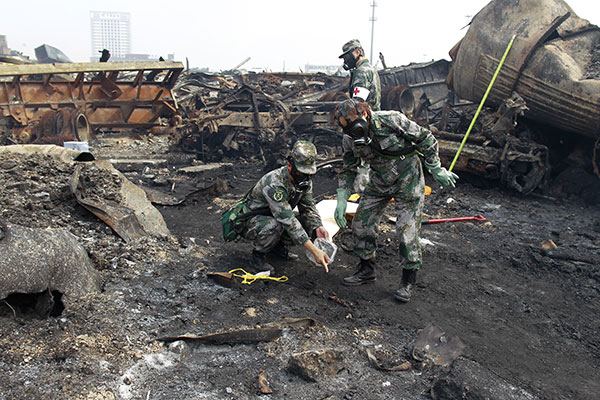 |
|
Wearing protective clothing and gas masks, members of the chemical defense team from the PLA Beijing Military Area Command take soil samples at the center of the Aug 12 blasts in Tianjin on Thursday. ZHU XINGXIN/CHINA DAILY |
Cyanide levels up to 356 times the national standard detected in warehouse blast zone
Large numbers of dead fish spotted offshore near the Tianjin blast zone have been examined and no hazardous cyanide compounds have been detected, the Tianjin municipal government said on Thursday night.
However, the cyanide levels in the core zone were 356 times higher than the national safety standard. Outside the zone, monitoring of air and water quality has found no abnormal rises, and the authority has increased the monitoring of soil pollution.
A belt of dead fish along the shore of Haihe River Dam has appeared, with pictures going viral online. The pictures have raised public speculation that the hazardous chemicals from the blasts have contaminated the water.
Experts have gone to the site to collect samples for further investigation, said Deng Xiaowen, head of environmental monitoring for the Tianjin Environmental Protection Bureau, at a news conference on Thursday afternoon.
The municipality announced that there were no toxic cyanide compounds in the offshore water samples at 8 pm.
Cao Shuxiang, from the fisheries bureau in Tanggu district, collected the water and fish samples at 5:30 pm, saying that it's not rare to see dead fish offshore in summertime due to a lack of oxygen in the water caused by excessive nutrients.
Yan Chao, a Tianjin resident for 15 years, said he has seen dead fish every year, but not in such large quantities as this year. "It's acceptable for us to feel worried about the contamination from the blasts. But I will believe the official results," he said before the results were released.
Environmental monitoring experts have detected some cyanide compounds in seawater from five monitoring stations near the blast zone, but they are in the normal range compared with the average level in past years, Deng said.
Data 'cannot be false'
Tian Weiyong, director of the environmental emergency center under the Ministry of Environmental Protection, backed Deng, saying the monitoring station data cannot be false because more than 90 nationwide monitoring experts have supervised the tests together.
Among the 42 water quality monitoring stations, 19 stations within the cordoned-off area around the core zone have detected sodium cyanide-a highly toxic chemical stored in the warehouse where the blasts occurred, Tian said.
Eight of them have found the concentration of the chemical to exceed national standards. "The largest concentration has been 356 times the national standard," he said.
In the areas outside the core zone, some stations monitoring water quality have detected the toxic chemical, but it has been within the national standard, said Deng of the Tianjin environmental authority.
Additionally, the air quality inside and outside the zone had no abnormalities on Wednesday, he said.
Authorities have set up 73 grids in an area covering 5 square kilometers around the zone to detect and treat soil contamination, another focus of treatment in the future, Deng said.
Contact the writers at tangyue@chinadaily.com.cn and zhengjinran@chinadaily.com.cn
